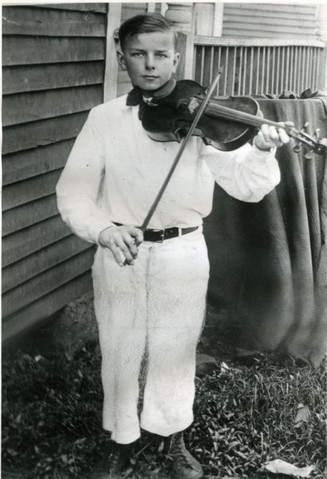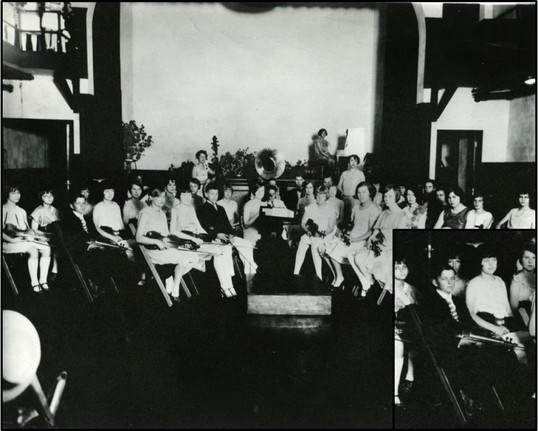|
Note: This post was previously listed under our "News from the Grey Box" blog series Part 1 of a 4-Part Series By Malorie Matos Senator Robert Byrd was well-known for his political accomplishments and prowess as a fiddler, but many may be unaware of just what an integral role fiddling played in the senator’s life. Senator Byrd’s passion for the fiddle began when he was a young boy in rural West Virginia. In one of his many “Byrd’s Eye View” newspaper columns, Byrd recalled the “good old days” growing up surrounded by country tradition and mountain charm. He wrote fondly of community “workings” where the children played and sang along to the “hill music” of the town fiddlers, as the elders shucked corn, quilted, or raised cabins. The gatherings were vital to the close-knit relationships of residents in those small mountain towns. The mountain music that they played created “a warm community spirit,” something Byrd kept in mind as he fiddled his way through several early political campaigns. The fondness with which Byrd talked about mountain music is evidence that the fiddle played a major role in the senator’s life even before he picked up the instrument himself. Byrd first developed his musical skills in the late 1920’s at the Mark Twain School in Raleigh County, West Virginia. It was there he learned to play the violin in the school’s orchestra. Byrd, who held first chair in his section, was once removed from that spot by his instructor. Determined to stay on top, Byrd practiced all that night and immediately earned back his place. This anecdote, taken from Byrd’s autobiography, reveals that his ambitious, hard-working nature was present even as a child. Using the chords and structure of the violin as his foundation, Byrd began teaching himself the fiddling songs that he so loved to hear in his community. Some of his favorite traditional mountain tunes included: "Cripple Creek," "Turkey in the Straw," and "Old Joe Clark."
Bobby Taylor, a fourth-generation champion fiddler and friend of Byrd’s, explained in a recent oral history how difficult it is for many violinists to successfully pick up the fiddle. Taylor admired the way Byrd taught himself to fiddle without sounding “a little stiff, a little regimented,” as is the challenge for many classically trained violinists who try to make the transition. Byrd’s skills developed as he grew older, and the fiddle quickly became one of his most enjoyable pastimes. He often played for his friends and at local square dances on Saturday nights for fun. Never one to shy away from a daunting challenge, Byrd entered a fiddling contest at the age of 14 in Beckley, West Virginia. He won first place in that contest, beating men who were already established fiddling champions. Senator Byrd referred to the win as “one of my happier memories,” a positive moment in an adolescence otherwise marked by the difficulties of the Depression years. Senator Byrd’s fiddling roots proved to be invaluable as he moved into his political career. His entertainment skills were extremely useful in his early years on campaign trails, allowing him to more effectively connect with voters and make a name for himself as he moved from the West Virginia House of Delegates to the U.S. House of Representatives to the U.S. Senate. Comments are closed.
|
Welcome to the Byrd Center Blog! We share content here including research from our archival collections, articles from our director, and information on upcoming events.
Categories
All
Archives
July 2023
|
Our Mission: |
The Byrd Center advances representative democracy by promoting a better understanding of the United States Congress and the Constitution through programs and research that engage citizens.
|
Copyright © Robert C. Byrd Center for Congressional History and Education
|



 RSS Feed
RSS Feed
